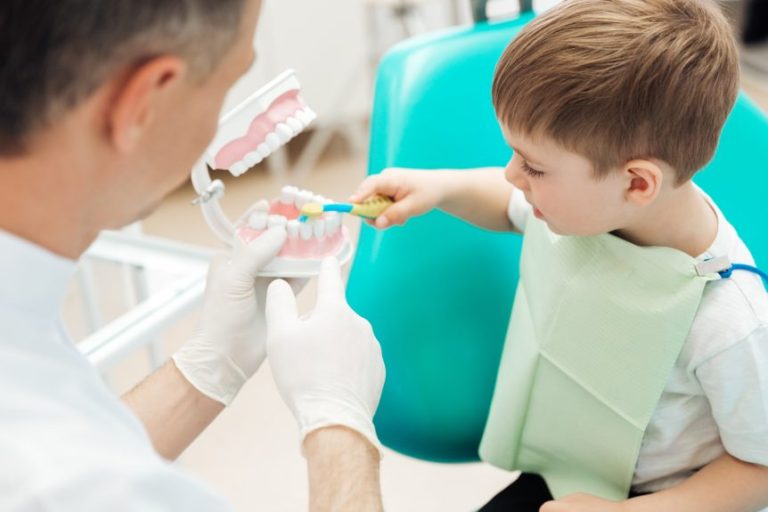
Proper oral hygiene habits are absolutely vital to both your oral and your overall health. These habits help to ensure the routine removal of the dental plaque that contributes to tooth decay and gum disease. This plaque contains harmful bacteria that, if it enters the bloodstream, can make its way to other areas of the body and cause extensive illness, disease and problems. Good oral hygiene habits help to keep your body healthy and comfortable, and are far less expensive or time-consuming than restorative dental treatments. Additionally, they can help to battle the bad breath that often affects self-confidence and self-esteem.
How to Maintain Good Oral Hygiene
Brushing the teeth-
- While you may understand that brushing your teeth is an important part of good oral hygiene habits, you may not understand that how you brush your teeth is even more important than the fact that you brush your teeth.
- It’s best to brush your teeth after you wake up in the morning, before you go to bed at night, and after you consume sugars or carbohydrates.
- To brush your teeth properly, hold your toothbrush at a 45-degree angle to the gums.
- Brush back and forth over every surface of every tooth, and then brush your tongue.
- It’s better to brush your teeth for longer than to brush them harder.
- long gentle brushing can ensure more bacteria removal, while harder brushing can be abrasive and harmful to the teeth.
- Make sure that you use the toothpaste that your dentist recommends, and use a soft-bristled toothbrush that you replace every three months.
Flossing your teeth-
- Toothbrush bristles simply aren’t fine enough to reach into all the crevices between your teeth and gums, which is why flossing is also important.
- Hold the floss securely with fingers from both hands, and ease it gently down in between the teeth.
- rub it up and down and curve it toward each tooth and under the gum line.
- Use a new section of floss for each tooth so that you don’t place removed bacteria and tooth particles in a new spot.
- Floss with waxed floss at least once a day, and consider using floss holders or wands if you have a hard time maneuvering the floss between your teeth.
Using Mouthwash-
- Antibacterial mouthwash can help to remove any harmful oral bacteria that has somehow lingered in your mouth after brushing and flossing.
- By removing it, you can help to protect against gingivitis and tooth decay.
Maintaining a Nutritious diet-
- Healthy eating habits are important to good oral health, as they contribute either too strong, healthy teeth or too decayed, weak teeth.
- A good diet provides one with plenty of nutrition, vitamins, and minerals to ensure that one’s teeth are as strong as possible and are not exposed to harmful substances.
Visiting your dentist for examinations and cleanings-
- Even the best oral hygiene habits at home are not enough to thoroughly protect or maintain good oral health.
- Your dentist possesses certain dental instruments, knowledge, and experience that you don’t have at home, and can, therefore, handle some situations you can’t handle at home.
- For example, if dental plaque hardens into tartar, there is nothing you can do about it at home.
- On the other hand, your dentist can remove it and even administer protective treatments so that your teeth are more resilient to bacteria in the future.
With good oral hygiene habits, your mouth will be healthier, more comfortable and less likely to suffer from bad breath, gingivitis, or tooth decay. Oral hygiene is not something you can do on occasion, when you feel like it, or when it’s convenient. You must adhere to a strict regimen every day, but the benefits are well worth the time and effort invested.
For more information about good oral hygiene habits, Contact your Dentist in Bowie.
Maintain Good Oral Hygiene: Tips for a Healthy Smile
Proper oral hygiene habits play a crucial role in promoting both your oral and overall health. These habits actively contribute to the regular removal of dental plaque, which is a major cause of tooth decay and gum disease. Harmful bacteria residing in plaque can enter the bloodstream and lead to various illnesses and complications throughout the body. By adopting good oral hygiene practices, you can safeguard your well-being, save on costly dental treatments, and combat the confidence-denting issue of bad breath.
Maintaining Excellent Oral Hygiene: Essential Tips for a Healthy Smile
Brushing your teeth:
- Frequency: Brush your teeth when you wake up, before bedtime, and after consuming sugary or carbohydrate-rich foods.
- Technique: Hold your toothbrush at a 45-degree angle to the gums. Thoroughly brush back and forth across all surfaces of every tooth, including the tongue.
- Pressure: Instead of applying excessive force, prioritize longer, gentle brushing to ensure the removal of bacteria without causing harm.
- Tool: Use a soft-bristled toothbrush recommended by your dentist and replace it every three months. Opt for the toothpaste recommended by your dentist for maximum effectiveness.
Flossing your teeth:
- Method: Hold the floss securely with fingers from both hands and gently guide it between your teeth. Move the floss up and down while curving it around each tooth and beneath the gum line.
- Hygiene: Use a new section of floss for each tooth to avoid transferring bacteria and food particles.
- Frequency: Aim to floss with waxed floss at least once daily and consider using floss holders or wands for easier maneuvering.
Using mouthwash:
- Rinse: Integrating an antibacterial mouthwash into your routine can help eliminate residual oral bacteria after brushing and flossing. Rinse with an antibacterial mouthwash to remove any lingering harmful bacteria.
- Benefits: By doing so, you can protect against conditions like gingivitis and tooth decay.
Maintaining a nutritious diet:
- Diet: Adopt a nutritious diet that promotes strong, healthy teeth and avoids dental decay.
- Nutrition: Ensure your diet includes ample nutrition, vitamins, and minerals to fortify your teeth against harmful substances.
Regular dental check-ups and cleanings:
- Schedule: Schedule regular examinations and cleanings with your dentist to maintain optimal oral health.
- Professional care: Dentists possess specialized instruments, knowledge, and experience to handle situations that cannot be addressed at home.
- Benefits: Professional dental care can remove hardened plaque (tartar) and provide protective treatments, strengthening your teeth’s resilience against future bacterial attacks.
By adhering to a strict daily regimen of excellent oral hygiene habits, you can enjoy a healthier, more comfortable mouth and reduce the likelihood of experiencing bad breath, gingivitis, or tooth decay. Moreover, oral hygiene is not an occasional or convenient task; rather, it is a necessary commitment that yields worthwhile benefits for your well-being.
For more information about good oral hygiene habits, Contact Dentist in Bowie.
